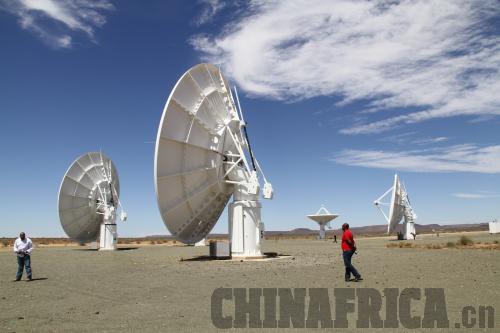| 
South Africa hosts the world's largest radio telescope, the SKA, yet only 5 percent of students in Sub-Saharan Africa complete tertiary education.
It is impossible not to have strong views when it comes to the debate on Africa's rise: despite solid economic growth and progress in poverty alleviation, people's views on the region's outlook remain stubbornly polarized.
Let me state up front that I am cautiously optimistic that Africa is taking off. This year the World Economic Forum (WEF) is marking 25 years of change in Africa. Looking back, there is no denying that Africa has made remarkable progress over the past two decades. Here are five reasons why I am optimistic.
1) The regional economy has grown steadily since 2001 and continues to do so at a rate of about 5 percent a year. Its macroeconomic environment is sound with low government debt, rising domestic resource mobilization and reduced inflation rates.
By 2013, more than 23 countries in Sub-Saharan Africa had per-capita GDP greater than $1,000. Infant and maternal mortality reduced significantly and access to primary education increased. According to the UN Human Development Index, 15 countries have attained medium to very high human development.
2) The consumer market is rising in tandem with its growing population. In 2008, McKinsey estimated that African consumers spent $860 billion on goods and services, which was 35 percent more than the $635 billion that Indian consumers spent, and just over the $821 billion spent in Russia.
3) The environment for doing business is improving. According to the World Bank, between 2013 and 2014, Sub-Saharan Africa realized the largest number of business regulatory reforms, and five of the top 10 countries that improved the most were from Sub-Saharan Africa.
4) Access to financial services is rising, thanks to the adoption of technology and innovation. For example, Equity Bank Kenya reaches out to more than 8 million customers in Kenya through its combination of an extensive network of physical bank branches and mobile financial services.
5) Africa is closing its gender gap. According to the WEF's Global Gender Gap Index 2014, Rwanda now ranks among the top 10 most gender-equal societies in the world in terms of economic and political participation. Burundi and South Africa rank 17th and 18th respectively.
Note of caution
Africa is made up of 54 countries and while on average they have done well, individually some have fared better than others.
Even within countries there are differences in the performances across rural and urban areas, sectors and populations. In the global context, the continent is subject to forces beyond its direct control, such as the recent plunge in global oil prices that has been a blessing for majority oil-importing countries and a curse to minority oil-exporting countries.
The recent past has also demonstrated unequivocally that the continent is vulnerable to shocks and, more disturbing, that a crisis in a single country can adversely affect the investment climate for the whole of Africa.
Roadmap
At the WEF on Africa 2015 in June, we will be calling on our regional and global leaders to rethink Africa's roadmap to prosperity in the 21st century with respect to three contexts.
First, Africa is challenged to better mobilize, efficiently use and safeguard its various resources in order to meet the enormous demands that it faces. For example, over the past five years, about 30 percent of global oil and gas discoveries were in Sub-Saharan Africa, yet only one third of Africans have access to electricity. Africa has 60 percent of the world's arable land, and yet is a net importer of food - importing food worth $35 billion a year.
And every year, although 10 to 12 million young people join the labor force, nine in 10 rural and urban workers are employed in the informal sector.
Second, Africa is challenged to accelerate the competitiveness, productivity and efficiency of its various markets.
The continent's current population of about 1 billion people is projected to double over the next 25 years, yet trade between African countries, at less than 15 percent, remains the lowest in the world. Africa is mainly exporting natural resources to the rest of the world, yet its share of global trade is about 3.3 percent.
Third, Africa is challenged to be more creative in developing solutions that are suited to its unique environment. At the end of 2013, there were 3.4 billion unique cellphone subscribers - just below half the global population - yet only 20 percent of African families have access to banks. South Africa hosts the largest radio telescope in the world, the Square Kilometer Array, yet only 5 percent of students in Sub-Saharan Africa complete tertiary education.
At a crossroads
Standing at these crossroads, Africans need to build on their rich cultural heritage to inform the difficult and complex intergenerational decisions that they face.
The array of opportunities is mind-boggling. For instance, should Africa's leaders invest more in "flying donkeys," building on the drone technology, in underground subways, in high-speed trains, in modernizing maritime services, in rural roads or in virtual technology?
Finally, an analogy could be the tale of the hyena that started off the day hunting for an antelope, on the way stumbled upon a warthog and chased after it, then got distracted by a rabbit and ended the day staring at a rabbit hole.
(Elsie Kanza is senior director and head of Africa at the World Economic Forum)
World Economic Forum on Africa 2015
Under the theme, Then and Now: Reimagining Africa's Future, the 25th World Economic Forum on Africa will take place in Cape Town from June 3-5. The forum will convene regional and global leaders from business, government and civil society to take stock of progress over the last 25 years, share insights on the present landscape, and identify innovative approaches to accelerate inclusive growth while bringing about sustainable development in the future.
(Source: WEF) |